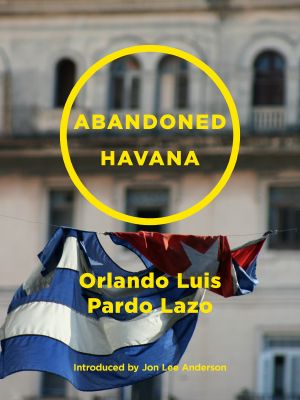Abandoned Havana

- Authors
- Lazo, Orlando Luis Pardo
- Publisher
- Restless Books
- Tags
- photography , subjects & themes , regional , fiction , science fiction , apocalyptic & post-apocalyptic , fic028070 , cuba , photoessays & documentaries , art , art & politics , pho014000 , art044000 , art037000 , travel , pictorials , caribbean & latin american , history , caribbean & west indies , pho019000 , trv019000 , havana , dystopia
- Date
- 2014-10-14T00:00:00+00:00
- Size
- 27.73 MB
- Lang
- en
“It is difficult to capture in images the soul of a landscape or a city.... Orlando Luis Pardo Lazo’s photographs, and the commentaries they are accompanied with, capture whirlwinds of souls and offer them to us in such way that our own soul is transformed." —Fernando Savater
Dissident Cuban writer, photographer, and pioneering blogger Orlando Luis Pardo Lazo presents a collection of surreal, irony-laden photos and texts from his native city. His “diary of dystopia”—an unexpected fusion of images and words—brings us closer to Havana’s scaffolded and crumbling facades, ramshackle waterfronts, and teeming human bodies. In this book, as beautiful and bleak as Havana itself, Pardo guides us through the relics and fables of an exhausted Revolution in the waning days of Castro’s Cuba.
REVIEWS
“It is difficult to capture in images the soul of a landscape or a city, perhaps because they don’t have one alone but many. Orlando Luis Pardo Lazo’s photographs, and the commentaries they are accompanied with, capture whirlwinds of souls and offer them to us in such way that our own soul is transformed. They teach us how to see inside out and toward the depth of things, without slipping on the surface of things.”
—Fernando Savater, author of Amador and winner of the Octavio Paz Prize
“Some [photographs] have a sly humor, others an abstract beauty...Mr. Pardo Lazo resists any easy categorization.”
—David González, The New York Times Lens Blog
“He is giving us the poetics of the city that is not touristy, nostalgic, or exotic...He is giving people a way to read the politics of daily occurrences...He juxtaposes the eternal beauty of the city and the real political urgencies of the moment.”
—Ana M. Dopico, New York University
ABOUT THE AUTHOR
Photographer and writer Orlando Luis Pardo Lazo was born in Havana, Cuba in 1971. Trained as a molecular biochemist, he is the webmaster for the blogs Lunes de Post-Revolución and Boring Home Utopics. His writing has appeared in Sampsonia Way Magazine, Diario De Cuba, CubaEncuentro, Penúltimos Días, All Voices, In These Times, Qué Pasa, and many other international publications. As an editor, he has compiled two anthologies of contemporary Cuban fiction translated into English and worked for the cultural magazine Extramuros as well as several independent Cuban digital magazines, including Cacharro(s), The Revolution Evening Post, and Voces. In 2012, he organized País de Píxeles, the first independent photodocumentary festival in Cuba. In 2013 his photographic work was profiled by David González of The New York Times. A resident of Havana, he visits the United States to give university lectures about social activism and Cuban civic society using new media.